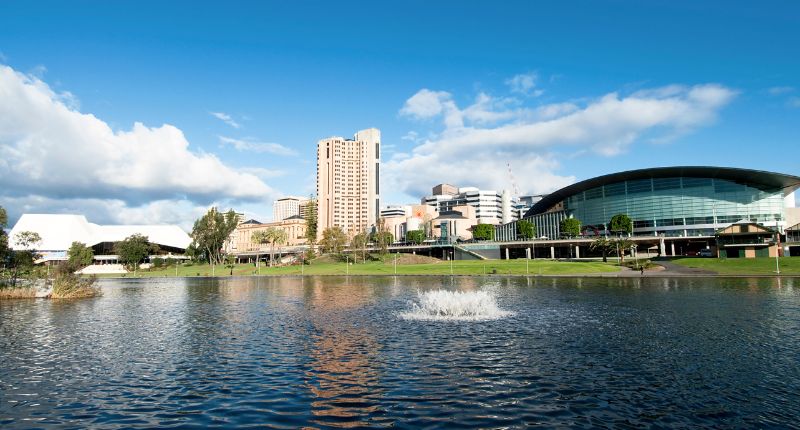
- The city performed poorly on innovation, transportation infrastructure, and productivity.
- Adelaide did well in terms of business environment and liveability.
- More work needs to be done for the city to stay competitive in the global arena.
Adelaide is an excellent place to be, but a groundbreaking new report has found that it needs to shore up its innovation, productivity, transportation, and infrastructure to stay competitive.
Benchmarking Adelaide compared Adelaide against 19 international cities* in areas including sustainability, liveability, transport, business investment, productivity, and skills.
The independent study aimed to examine Adelaide’s track record against similar liveable medium-sized cities, like Austin, Portland, and San Diego, to identify its strengths and weaknesses.
Opportunities abound in Adelaide
Written by leading urban intelligence firm The Business of Cities, the research was commissioned by the Committee for Adelaide, JLL, Deloitte, Royal Automobile Association of South Australia (RAA), and Hames Sharley to help inform Adelaide’s post-COVID-19 policy discourse, legislation, and investment.
Accordingly, the report found that Adelaide had abundant opportunities, boosted by its robust population growth, enticing business environment, and healthy corporate demand.
The report argued that Adelaide’s strong base of multi-national companies was the driving force behind the high foreign investor demand it enjoys. Additionally, it stated that Adelaide exceeded all expectations regarding the investment it attracted in the creative and technology sectors.
How did Adelaide rank?
| Rank | Description |
| 2nd | Contemporary arts scene. |
| 3rd | Business and investment dynamics. |
| 5th | Liveability, affordability, and wellbeing. |
| 9th | Skills, knowledge, and population. |
| 15th | Innovation, research and development. |
| 16th | Amenity, vibrancy, experience. |
Source: Benchmarking Adelaide report.
For business and investment dynamics, Adelaide was only one of three cities to be rated a top place, globally, for artificial intelligence investment.
The city also recorded the highest rate of homeownership among peer cities.
Adelaide’s contemporary arts scene was second behind Austin.
What does Adelaide need to improve on?
The city ranked 15th for innovation, research and development and 16th for amenity, vibrancy, and experience. Adelaide’s productivity was nearly 20% below its peers, with 10% fewer jobs in high-paid sectors.
The report stressed that Adelaide needed to encourage more demand for high-skilled and high-paid jobs to become a high-productivity economy.
“This report has reinforced Adelaide’s standing as a great place to live and work, but it has also identified weaknesses that are holding back our true economic and social potential,” said COA CEO Sam Dighton.
“Crucially, the report highlights that Adelaide’s economic productivity is behind that of its comparable international peers, and we have a lower share of jobs in high-wage, knowledge-rich sectors.
The capital city’s transport and infrastructure services also left much to be desired, not keeping pace with its peers in terms of commute times and cycling infrastructure.
Adelaide was the sole peer city where the time lost to congestion grew since 2019, and it ranked last among the cities for the quality of its bike network.
RAA CEO Nick Reade agreed with the assessment.
“When it comes to transport and infrastructure, this report validates much of what we already know – that Adelaide is falling behind where it needs to be,” he said.
“We need to make public transport more efficient and attractive to commuters, we need to invest in cycling infrastructure and transition all transport to zero emissions.
“Adelaide ranking 6th in population growth is positive, but this highlights the need to prioritise investment in our transport system and key infrastructure projects, particularly in high growth areas.”
More work is needed for the city to stay competitive
While the report commended Adelaide for its impeccable living standards, health and service, liveability, and affordability, it noted that the city was becoming less affordable.
Its peers were squaring the score, even outpacing Adelaide in wellbeing, public transport, walkable neighbourhoods, and access to green space.
The report advised that the capital city focus on fostering its innovation niches, boosting its reputation for quality of life, preparing for climate change, and steering away from unsustainable and unproductive growth.
~~
* The 19 cities Adelaide was compared to include: *Antwerp, Auckland, Austin, Bilbao, Bordeaux, Busan, Cape Town, Cardiff, Edmonton, Fukuoka, Muscat, Penang, Portland, Porto, Pune, Sacramento, San Diego, Valencia and Valparaiso.







